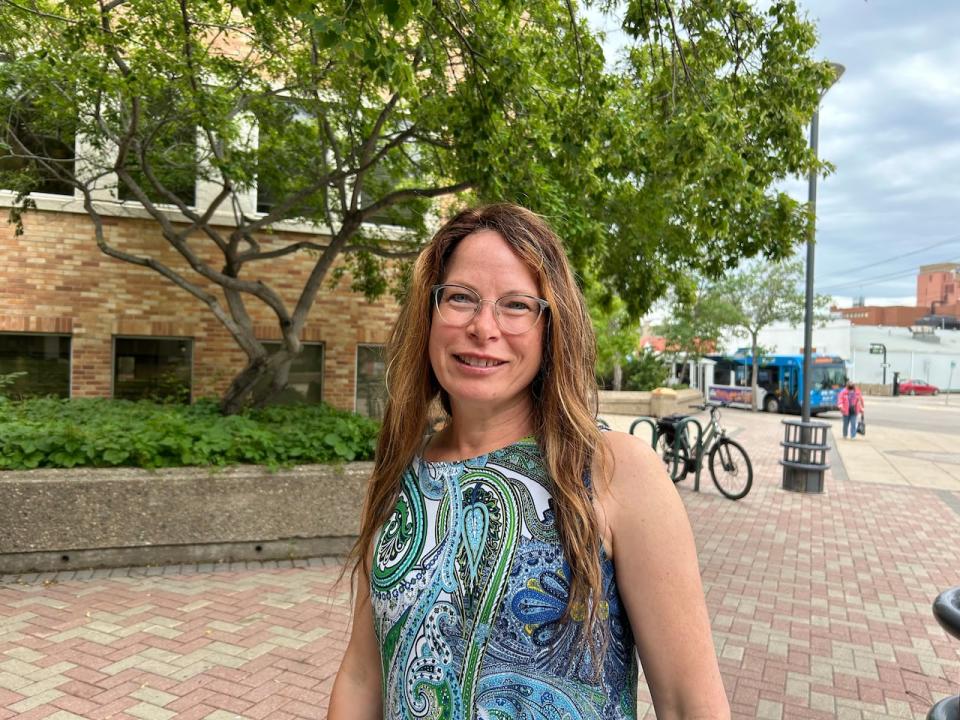Decision on divisive Saskatoon zoning changes delayed by long speaker list
A long list of concerned citizens speaking at Saskatoon city council pushed back the vote on a massive overhaul of the city's zoning rules that would allow fourplex development across much of the city and four-storey apartments in some neighbourhoods.
The vote is now scheduled for Friday sometime after city council reconvenes at 10 a.m.
The vote was pushed forward after a full day of listening to speakers at Thursday's special council meeting. It started at 9:30 a.m. with a list of dozens of people waiting to speak. The last speaker finished shortly before 7:30 p.m.
The speakers — and the hundreds of letters submitted to council — were split on the issue.
The zoning changes are among the eligibility requirements for the city to access the federal government's Housing Accelerator Fund (HAF) — which would inject more than $41 million into affordable housing and help address the city's housing crisis.
Saskatoon's census metropolitan area grew by 16,161 people in the last year, according to a recent Statistics Canada report. In order to accommodate that growth, the city says more than 5,000 homes are needed — but only less than half of that number have been built, mostly in relatively expensive housing.
According to a City of Saskatoon FAQ, the federal funding is meant to focus on increasing what's known as the "missing middle, the range of housing types that fit between single-family detached homes and mid-to-high-rise apartment buildings."
Allowing fourplexes across the city
The first big change would be allowing four units on most lots that are at least 15 metres (50 feet) wide in the city as a default. Presently, most lots are occupied by single-family homes, but are allowed to have a duplex or semi-detached home on them.
The proposed zoning changes would therefore effectively double what's allowed on many lots, from two units to four.
These could be row-style houses, or they could be stacked with two units on the bottom and two on top, or they could be small apartments with two homes at the front and two in the back.
In certain areas of the city, the new zoning changes would go even further.
Saskatoon is in the process of rolling out Bus Rapid Transit, a revamped version of the city's transit system with high-frequency buses along main routes, and routes in smaller neighbourhoods feeding into those routes.
As part of that plan, the city is hoping to establish "transit corridors," or places with denser development made up of more apartments and condos instead of single-family homes. Under the proposed zoning changes, most housing within 800 metres of a rapid transit stop would be allowed to be four storeys in height.
Dozens of speakers scheduled
The issue has been a hot one for debate. More than 50 speakers were expected during Thursday's meeting. Council also received 392 letters, both supporting and against the proposed changes.
Jeff Jorgenson, the city manager, said the city could receive $100 million to $120 million in the first 10 years of two federal programs, HAF and the Canada Public Trust Fund.
"What we decide today can determine what we get tomorrow," Jorgenson said, recommending that the city accepts the proposed amendments.
Sherry Olson from the Saskatoon Housing Initiatives Partnership was the first speaker Thursday. She lives in Lawson Heights and said more housing is needed.
"Things are already going wrong," she said.

Olson said she knows four people with full-time jobs who cannot afford rent.
"Our hidden homeless are increasing. We need more housing capacity."
She said the plan makes fiscal sense.
"We allow affordability by allowing these options."
Robert LaFontaine, from Saskatoon Housing Initiatives, agreed.
"It is our view that the affordable housing crisis is in direct correlation to the increasing number of people who are homeless in the city," he said, noting contributing factors like low vacancy rates, high rents, the opioid crisis and inter generational trauma.
"The housing situation in Saskatoon is in a crisis."
LaFontaine said HAF is an opportunity to address these issues and increase economic growth. He hopes more units are built in the core neighbourhoods.
Patricia Polowick was one of the people speaking against the proposed changes. She said she and her husband have lived in the City Park neighbourhood for 40 years.
Polowick said she is concerned about elm trees and the character of the neighborhood.
She said trees, "some big enough for two people to put arms around," have been lost and that further development will lead to more of that happening.
"I firmly agree with densification … but you can't do it with one blanket that fits all," Polowick said. "Please consider all consequences."
Michael Bischoff said he is not opposed to densification but to blanket zoning. He said there are also concerns of privacy, noise and parking spaces.
"Potential devaluation of a property I have purchased is a significant concern," he said. "Had I known about this kind of change, I wouldn't have purchased that property."
Bischoff said the consultation process for the proposed changes has been "nothing short of horrendous."
'An unprecedented situation': Clark
On Wednesday, Saskatoon Mayor Charlie Clark said the process has been more rushed than he would have liked, but the federal dollars on the table push the issue forward.
"This is an unprecedented situation where we have federal funding that has conditions attached and we've had very little time to talk to residents about the proposals," he told Saskatoon Morning host Theresa Kliem.
LISTEN | Some find the goals of federal housing accelerator money restrictive, others find it necessary:
Clark said some conditions, like the zoning changes, are going to be required for the city to get other future funding as well.
"At the same time, we're also learning, and just in the last week, that this is not just going to be attached to federal funding for the Housing Accelerator Fund, but to any funding programs that are coming up."

Mayoral candidate Gordon Wyant, a former Saskatchewan Party cabinet minister, said Wednesday that he wants council to delay the vote, given that the several councillors and the mayor have decided not to run for re-election.
Wyant said while it "is a good idea" to enhance the delivery of affordable housing in the city, the whole process has been rushed.
"There's a lot of people in the city that have some significant concerns about how it's going to affect the city … it requires some serious consideration, especially given the amount of concern that's been expressed in the community," he said.



